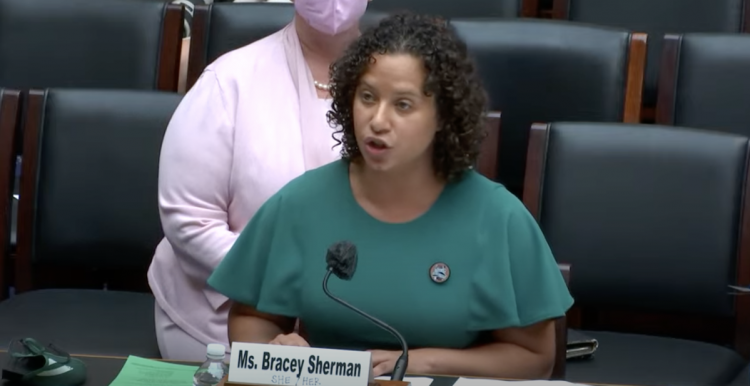Following a series of congressional hearings on the impacts of the end of Roe v Wade, including stories from people who have had abortions, an abortion rights advocate explained in powerful testimony on Tuesday how people can self-manage their medication abortions.
The explanation appears to be the first-ever testimony to Congress showing how to use abortion pills outside of a traditional medical setting.
Renee Bracey Sherman, the founder of We Testify, which highlights stories from people who have had abortions, condemned the growing number of state-level restrictions or outright bans on abortion care after the US Supreme Court struck down the constotutional right to abortion.
Ms Bracey Sherman said she had an abortion when she was 19 years old at a clinic 10 minutes from her home where a nurse held her hand through the procedure, which “almost wasn’t my story,” she told the House Energy and Commere Committee on 19 July.
“Shortly before my appointment, I didn’t know if I could hold on,” she said. “I hoped it would all go away. And when it didn’t, every day I considered throwing myself down the stairs as I had seen in movies and in history books. One night I drank an unsafe amount of alcohol thinking it would cause a miscarriage. It didn’t. Thankfully, I went to my appointment and received my abortion. That was when it was legal in every state. Now it is not, and I know some will try the methods I did. I want them to know there are safe methods to self managing their abortions.”
She then explained the regimen for medication abortion – a two-drug protocol that is overwhelmingly the most common form of abortion care, which can often be prescribed online and taken in the comfort of a patient’s home, but is now illegal in at least nine states and counting.
“It is one mifepristone pill followed by four misoprostol[s], dissolved under the tongue, 24-48 hours later, or a series of 12 misoprostol pills, four at a time, dissolved under the tongue every three hours,” Ms Bracey Sherman explained.
“There’s no way to test it in the blood stream and a person doesn’t need to tell the police what they took,” she said. “I share that to exercise my right to free speech, because there are organisations and legislators who want to make what I just said a crime.”
Abortion drugs were approved for use by the US Food and Drug Administration in most cases up to 10 weeks of pregnancy in 2000. The drugs, which are available over the counter in many countries, are overwhelmingly safe and effective. Though they face similar restrictions to receiving in-person care – including mandatory appointments, waiting periods, long-distance travel – as they would for procedural abortions, and many states are also making it illegal to obtain the medication by mail.
Last year, the FDA permanently lifted the in-person requirement for medication abortion prescriptions, allowing patients to access the drugs via telehealth appointments and online pharmacies so patients can take the drugs at home.
Within the last year, anti-abortion state lawmakers across the US – anticipating the Supreme Court’s decision in Dobbs v Jackson Women’s Health Organization – filed more than 100 bills to restrict their availability and distribution, or to ban them altogether.
The drugs also are also commonly used to treat miscarriages. Mifepristone and misoprostol are the only drugs recommended by the American College of Obstetricians and Gynecologists to treat an early pregnancy loss.
“The bans and restrictions are designed to shame us and make abortion hard or impossible to aceess,” Ms Bracey Sherman told the House committee in her opening remarks. “These situations are tragic, not only because people must remain pregnant longer than they want to be often while caring for the children they already have, but because the very leaders who forced them to do so also block child tax credits, the Medicaid expansion, and refuse to engage in conversations about paid parental or sick leave, or affordable healthcare, or affordable childcare, or even create a national healthcare system.”
She closed her opening statement stating that “no one should be prosecuted for the outcomes of their pregnancies, where it is miscarriage, stillborn or abortion.”
“Everyone loves someone who has abortions,” she said. “Ask yourself: Who do you love that you’d be willing to lock up simply because they had abortions?”
Virtual clinics, mutual aid organisers, abortion rights advocates and overseas aid groups have mobilised to help connect patients to abortion drugs in the wake of the Supreme Court decision.
Austria-based Aid Access prescribes abortion pills to people across the US, circumventing state laws criminalising US-based providers. Advocacy group Plan C also offers instructions on how to access abortion pills. Just the Pill, which provides abortion pills in four states, also has deployed mobile clinics to operate along state borders to help patients in anti-abortion states acccess the drugs.
Source by www.independent.co.uk





























